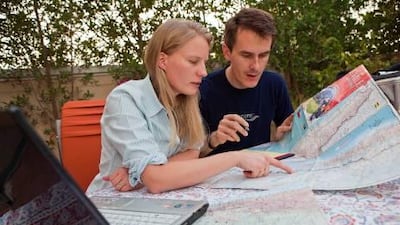A home, steady income and perhaps a family: these are the traditional priorities for young couples.
But that is not quite the case for two Dubai residents who have until spring next year to sell their furniture, give up their two-bedroom house with a garden, find a home for their dog and pack their bags.
In March, David and Theresa Wernery are setting off on a 160,000km drive around the world. The journey through more than 50 countries will take up to 18 months to complete.
But the trip is not just about adventure. Under the slogan, "Plastic not so Fantastic", the couple hopes to raise awareness of plastic pollution and meet like-minded activists in each country.
"Our purpose is to find interesting projects elsewhere and to bring that experience here upon our return," said Mrs Wernery, 28, who works in investment banking.
Without a mission of this sort, the trip would "seem a bit pointless", said the law graduate who was born and raised in Abu Dhabi.
The couple chose to campaign against plastic pollution after finding rubbish at their favourite camping spots in the UAE and Oman.
"It is rare for us to go out and not find rubbish, at least a plastic bag adorning a tree," Mrs Wernery said.
Another inspiration is Mr Wernery's father, Dr Ulrich Wernery, the scientific director of the Central Veterinary Research Laboratory in Dubai. Over the years, Dr Wernery has tracked hundreds of domestic and wild animals that have died slow, painful deaths after eating plastic.
"We are really not here to condemn plastic use altogether," said Mr Wernery, a legal expert. "We are driving in a car which is three quarters plastic. But we want to make people aware."
The Wernerys have created a website, pnsfexpedition.com, as a platform for their campaign. It will also give people a way to track their journey.
The trip will start in Dubai. The couple will ship their car to Iran, then head to Turkey and eastern Europe. Germany will be the first point for restocking supplies and a car check-up.
From there, they will continue through eastern Europe and on to central Asia. They plan on reaching Mongolia in August or September next year.
From Mongolia, the couple will drive through eastern Russia, spending part of their time on Siberia's Kolyma Highway, also known as the Road of Bones for the political prisoners who died building it.
The Russian leg will end in Vladivostok, a port on the Pacific Ocean, from where they will ship their car to Australia. They plan to stay in Australia until just before Christmas, then ship the car to Chile. The holidays will be spent with Mrs Wernery's sister Miriam and her family in Santiago, the capital.
The 40 days it will take the car to reach Chile will give the couple a much-needed chance to rest after almost a year on the road, spent mostly camping. They would be happy to only occasionally sleep in a bed, if invited by local hosts.
"The rooftop tent is really comfortable to sleep in," Mrs Wernery said.
From Chile, the trip continues through South and Central America, and along the west coast of the US. After reaching Alaska, the Wernerys plan to head east through Canada and down the east coast of the US, arriving in New York late in the summer of 2013.
From there the car will be shipped to South Africa.
The African leg of the journey -including Rwanda, Tanzania, Kenya, Ethiopia, Sudan and Egypt - will include tree planting to offset the carbon emissions from the trip.
"The petrol we burn over 160,000km will have a smaller carbon footprint [124 tonnes of greenhouse gases] than that of living in our house for a year," Mrs Wernery said.
They will plant about 170 trees, probably in Kenya, Tanzania or Ethiopia, Mr Wernery said, and are then likely to return to the UAE through Saudi Arabia.
"We will miss our house, our friends and Dubai, but it will be an exciting adventure," he said.
The long, long route home
Covering 160,000km, the trip will take in more than 50 countries including: Iran, Turkey, Bulgaria, Serbia, Austria, Germany, Ukraine, Kazakhstan, Tajikistan, Uzbekistan, Mongolia, Russia, Australia, Chile, Peru, Ecuador, Colombia, Panama, Mexico, the US, Canada, South Africa, Rwanda, Tanzania, Kenya, Ethiopia, Sudan, Egypt and Saudi Arabia.

